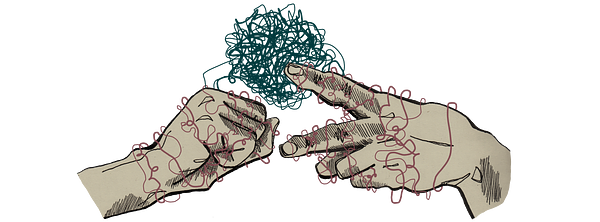Professionals and Practitioners
This digital resource tells the story of how our brains interpret the world around us and how this translates in our bodies, emotions and behaviours. It has been designed to be used by professionals working with young people interested in learning more about the science of conflict and boosting their wellbeing.

Attachment and Brain Development
Summary
- Brain growth is shaped not only by genetics, but also by the environment.
- If a baby feels loved and cared for, the associated brain cells and brain regions for love, social connection and emotional regulation will grow, and we will have an easier time managing our feelings and maintaining healthy relationships as adults.
- If we experience an unhappy or damaging environment as a baby, our brains prepare for physical, emotional, and social survival in a world which is dangerous and uncaring. The brain cells and associated brain areas, the amygdala (emotion and threat detector), can become overactive.
- This kind of brain development can increase the risk of mental health difficulties in adolescence and adulthood and we may find regulating emotions and connecting socially more difficult.
Scientists used to believe that the human brain grows only according to the genetic material we inherited from our parents. No matter how we were treated and what we witnessed as children, our brains would only be influenced by genetics.
Modern science has revealed, however, that brain growth is shaped not only by genetics, but also by the environment.
Human beings possess a highly adaptable mind, which enables us to grow into a person that is most likely to survive in their specific environment and culture. Babies grow millions of new brain cells every day; our brains double in size by the time we are one-year-old. The environment we are born into, and the experience we have with our caregivers, shapes the way our brains develop. As babies, our brains are more adaptive than at any other point in our life. In psychology, we call this ‘neuroplasticity’.
A human baby will adapt to a healthy and loving environment created by their caregivers and grow into a child with millions of brain cells (which are called ‘neurons’) that can communicate rapidly with the areas of the brain which shape our personality, our decision-making, and how we experience the world.
A positive and caring environment in early life means a baby’s brain will grow into an adult brain that is primed to be productive, self-assured, thoughtful, motivated, connected to others, and live a meaningful life.
If we experience an unhappy or damaging environment as a baby – for example, if our parents are not able to offer consistent love and care – then our brains will adapt to a world which is scary, isolating, and ignores our emotional needs. Our brains will develop into organs that are primed for physical, emotional, and social survival in a world which is dangerous and uncaring. This kind of brain development increases the risk of this baby experiencing struggles with their relationships and possibly mental health difficulties in adolescence and adulthood.
As babies, we are born with an abundance of brain cells – in fact, between the ages of two and ten, half the number of connections between brain cells (which we call ‘synapses’) will die. This is a normal and healthy part of development. Unused brain cells will die, whilst used ones grow and surviv
If a baby feels loved and cared for, the associated brain cells and brain regions for love, social connection and emotional regulation will grow, and we will have an easier time managing our feelings and maintaining healthy relationships as adults.
In psychology, we call this ‘synaptic pruning’.
This means that if a baby feels loved and cared for by its parents, the associated brain cells and brain regions for love, social connection and emotional regulation will grow, and we will have an easier time managing our feelings and giving and receiving love as adults.
However, if a baby feels afraid and unloved, the brain cells and areas in the brain associated with love and connection won’t grow. They will therefore find regulating their emotions and connecting socially much harder as adults. Conversely, the brain cells for babies who are neglected and abused are heavily stimulated, meaning that as grown-ups, they will have much larger ‘fear centres’ in the brain (the part called the ‘amygdala’, which is where the brain processes feelings) and will become more easily afraid. They will find it more challenging to feel relaxed on a day-to-day basis than other people.
It is important to emphasise that it is not a person’s fault if their brain has developed a certain way in response to their experiences as a baby. In fact, this is something human beings – and many other animal species – have been doing across the course of evolutionary history. This process is your brain trying to grow into an organ that will equip the rest of your body with the best chance of surviving in your specific environment.
A baby’s brain develops an overactive amygdala is attempting to develop a physiological system that is more aware of potential threat, as the brain has detected through experiences of adverse experiences, that the world is a frightening and threatening place. If the brain had ‘ignored’ this environment, then the baby might have developed a brain which was overly trusting of all people, which would have diminished the chances of surviving in such a hostile world.
It is important to recognise that while early attachment has a significant effect on brain development, our brains are constantly changing. There are lots of things that can be done to rewire the brain and strengthen the connections in different parts of the brain to help us build meaningful, healthy relationships and regulate and respond to our emotions in a positive way.
References and Further Reading
- Attachment and Brain Development in Infancy and Beyond by Terry Levvy. Evergreen Psychotherapy Center, 2019.
- Attachment and Early Brain Development – Neuroprotective Interventions in Infant–Caregiver Therapy by Louise Newman, Carmel Sivaratnam and Angela Komiti.
- The Neurobiology of Attachment to Nurturing and Abusive Caregivers by Regina M Sullivan. National Library of Medicine, 2016.





